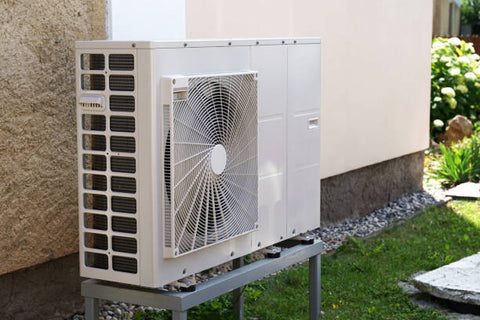When it comes to heating your home, the choice between air-to-water heat pumps and traditional heating systems is a critical one. In this section, we'll compare these two options to help you make an informed decision about the most suitable system for your heating needs.

Air to Water Heat Pumps
Advantages:
Energy Efficiency: Air-to-water heat pumps are renowned for their exceptional energy efficiency. They transfer heat from the outside air to heat your home rather than generating heat, resulting in significant cost savings.
Eco-Friendly: These heat pumps produce minimal greenhouse gas emissions, making them environmentally friendly and contributing to a greener planet.
Dual-Functionality: They provide both heating and cooling, offering year-round comfort in one system.
Quiet Operation: Air-to-water heat pumps operate quietly, ensuring a peaceful indoor environment.
Considerations:
Climate Sensitivity: The efficiency of air-to-water heat pumps can be affected by extreme cold, so they may not be ideal for regions with harsh winters.
Installation Costs: While they offer long-term savings, the initial installation cost can be relatively high.
Traditional Heating Systems (Furnaces and Boilers)
Advantages:
Fast Heating: Traditional heating systems can provide quick and intense heat, ideal for extreme cold conditions.
Proven Technology: Furnaces and boilers have been used for many years, and their reliability is well-established.
Considerations:
Energy Inefficiency: Traditional systems often rely on fossil fuels, making them less energy-efficient and environmentally harmful.
Limited Cooling Capability: They do not offer cooling, necessitating the installation of a separate cooling system.
Higher Operating Costs: Due to their lower energy efficiency, these systems can result in higher operating costs.
Choosing the Right System
The decision between air-to-water heat pumps and traditional heating systems depends on several factors:
Climate: Consider your local climate. In milder climates, air-to-water heat pumps are often more cost-effective, while traditional systems may be preferable in extremely cold regions.
Energy Costs: Compare the cost of electricity and the energy source (e.g., natural gas, oil) for traditional systems to determine which is more economical.
Long-Term Savings: While the initial installation cost of air-to-water heat pumps may be higher, their long-term energy savings can offset this expense.
Environmental Impact: If reducing your carbon footprint is a priority, air-to-water heat pumps are a greener choice.
Year-Round Comfort: Consider whether you need both heating and cooling capabilities, as air-to-water heat pumps provide both functions.
Conclusion
The choice between air-to-water heat pumps and traditional heating systems ultimately depends on your specific needs, budget, and environmental concerns. It's important to weigh the advantages and considerations of each option to make an informed decision.
In an era where energy efficiency and environmental responsibility are paramount, air-to-water heat pumps often stand out as a more sustainable and cost-effective choice. However, your geographic location and individual preferences play a significant role in determining the ideal heating system for your home.
To explore the best heating solutions for your specific circumstances, consult with a local HVAC system expert who can provide tailored advice and installation services to ensure your home remains warm, comfortable, and environmentally friendly.

